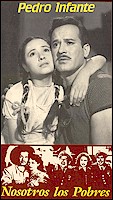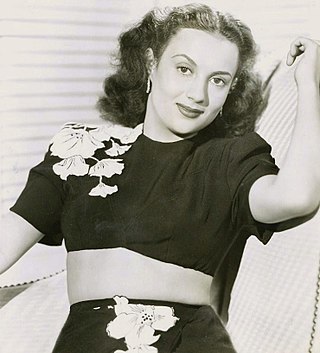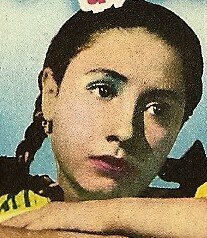
Angélica María Hartman Ortiz, also known as "La Novia de México", is a Mexican singer and actress. She debuted as a child actress in the Golden Age of Mexican Cinema in films such as Pecado (1951), Una mujer decente (1951) y Mi esposa y la otra (1954). During the 1960s, she became a teen idol in Mexico thanks to her telenovelas and films, along with her musical career with compositions by Armando Manzanero that made her known as a rock and roll and pop ballad singer. Her hits include the Hot Latin Tracks top 40-singles "El hombre de mi vida", "Reina y cenicienta", "Prohibido" and "El taconazo".

Bertha Moss, born Juana Bertha Moscovish Holm, was an Argentine actress of stage, television and film, famous for appearing in many Mexican telenovelas.

Gloria Méndez Ramos, known professionally as Gloria Marín, was a Mexican actress. She was considered a celebrated female star of the Golden Age of Mexican cinema.

María Blanca Estela Pavón Vasconcelos was a Mexican film actress and singer of the Golden Age of Mexican cinema.

Nosotros los pobres is a 1948 Mexican drama film directed by Ismael Rodríguez, and starring Pedro Infante, Evita Muñoz "Chachita" and Blanca Estela Pavón. The film is the first in a trilogy of movies, with Ustedes los ricos following in 1948 and Pepe el toro in 1953. All three were produced during the Golden Age of Mexican cinema.
Arturo Soto Rangel was a Mexican film, television, and stage actor. Soto was best known for appearing in over 250 Mexican films. He appeared in one American movie, The Treasure of the Sierra Madre, which won three Academy Awards and starred Humphrey Bogart, Walter Huston, Tim Holt, Bruce Bennett, and many other successful actors. Soto last appeared on television in 1963, where he starred in Voy de gallo.
Ustedes los ricos (You the Rich) is a 1948 Mexican film. The film is the second in a trilogy produced during the Golden Age of Mexican cinema, starting with Nosotros los Pobres (We the Poor) earlier in 1948 and followed by Pepe the Bull (Pepe, el toro) in 1953. Ismael Rodríguez directed all three films, with Pedro Infante as Pepe the Bull and Evita Muñoz "Chachita" as his daughter Chachita, while Blanca Estela Pavón only appeared as Celia in the first two, as she died in a plane crash in 1949.

María Elena Marqués Rangel was a Mexican actress and singer who was a star during the Golden Age of Mexican cinema in the 1940s and 1950s.
Bonny Cepeda is a merengue artist, band leader and producer. In 1986 he was nominated for a Grammy Award for Top Tropical Latin Performance for his album, Noche de Discotheque.
Amparo Arozamena was a Mexican actress of film and television, best known for her character roles in the 1960s. During the same decade, she became most noted for her role of "Doña Chole" in the Telesistema Mexicano sitcom Los Beverly de Peralvillo (1968–1973). Arozamena had been acting since her early teens and had her first feature film released at the age of thirteen.

Qué bonito amor is a Mexican telenovela produced by Salvador Mejía Alexandre for Televisa that aired on Canal de las Estrellas from October 22, 2012, to June 2, 2013. It is based on La Hija del Mariachi, produced by Colombian's RCN Television and written by Mónica Agudelo in 2006–2007. Production of Qué bonito amor officially started on August 9, 2012. In the United States the telenovela aired on Univision from April 15, 2013, to October 4, 2013.
Grupo Yndio is a Mexican band from Sonora founded in 1972, by some of the members of the dissolute Los Pulpos.

Manuel Dondé was a Mexican film actor. He frequently played villains during his long film career.
Pepe the Bull is a 1953 Mexican sports drama film directed by Ismael Rodríguez and starring Pedro Infante, Evita Muñoz "Chachita" and Amanda del Llano. It was the last in a trilogy of films featuring Infante and Muñoz playing the father and daughter characters in the 1948 releases Nosotros los Pobres and Ustedes los ricos . A planned fourth film in the series was cancelled when Infante died in 1957. The film was nominated for four Ariel Awards.
Conchita Gentil Arcos was a Mexican actress of the Golden Age of Mexican cinema as a character actress in supporting roles.
¡Ay, Jalisco, no te rajes! is a 1941 Mexican film directed by Joselito Rodríguez, starring Jorge Negrete, Gloria Marín and Carlos López. It is the prequel to El Ametralladora, starring Pedro Infante in the role as Salvador Pérez Gómez 'El Ametralladora'. It is based on the book ¡Ay, Jalisco, no te rajes! by Aurelio Robles Castillo. Evita Muñoz was five years old when she played the character Chachita in the film, and also earning her the nickname she was known by for the length of her career. It was released at the Cine Olimpia on November 12, 1941.
María Teresa Rivas was a Mexican actress. Along with Silvia Derbez, she is considered one of the pioneers of telenovelas in Mexico, appearing in more than 50 in her career, beginning with an iconic villain role in Gutierritos (1958).
Yolanda Ciani was a Mexican actress.








